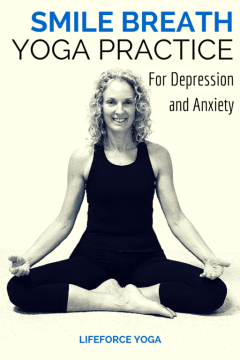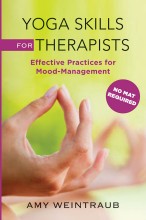
If you could learn a simple, five-second breathing exercise that could shift your energy and lift your mood, providing a natural remedy for depression and anxiety, would you try it? There are no contraindications for this practice and you can do it anywhere. It’s almost too simple to be true, but try this with me right now, and feel the difference for yourself.
The “Smile Breath” is easy enough that you can read the following instructions, and then close your eyes to practice. Or, if you prefer, keep your eyes open and practice as you read. Take a deep inhale through the nose, hold the breath for a heartbeat or two, and then as you exhale through the nostrils, drop your chin to your chest. Hold the breath out for a heartbeat or two, as you lift the corners of your mouth. Inhale and lift your head. Exhale and open your eyes. How do you feel? If you’re like me and my students and clients, you likely feel calmer.
So what elements of the Smile Breath might affect your mood? First of all, to practice this simple breath, you need to pause for a moment, taking a break from the thoughts and feelings rolling through your mind. Second, taking just one deep breath uses more of your lungs than you may have been using the moment before. In that instant, you are bringing more oxygen into your system, feeding your brain. Think about the slumped shoulders and shallow breath that often accompanies depression. Think about the short shallow breath that often accompanies anxiety. In both anxiety and depression, there is often not enough oxygen in the blood flowing to the brain. Taking a deep breath can begin to reverse that. Third, when you lift the corners of your mouth, you are likely lifting the mood. A 2006 small-scale pilot trial, published in the Journal of Dermatologic Surgery, found that Botox injected into frown lines around the mouth or in forehead furrows of 10 women eliminated depression symptoms in nine of them and reduced symptoms in the 10th. (Finzi, 2006) I’m not suggesting you get Botox injected into your third eye, but what this study shows is that when you change the muscles of our face, we are affecting our mood.
Previous research has shown that the 12-step adage, “fake it until you make it,” may have some validity. More than twenty years  ago, researchers at Loma Linda University School of Medicine showed the biochemical changes produced by laughter—reductions in serum levels of cortisol, dopac, and epinephrine. (Berk, 1989) Since then, a number of studies have looked at the efficacy of laughter and smiling in improving self-efficacy in the workplace, mood in cancer patients, depression in the elderly, and the pre-operative effects on children undergoing surgery. (Shahidi, Mojtahed, Modabbernia, Mojtahed, Shafiabady, Delavar, Honari, 2011; Noji, Takayanagi, 2010; Mora-Ripoll, 2010; Ko, Youn, 2011 Jul;11) In all cases reviewed, laughing “for no reason” has had a positive effect on mood. The body doesn’t know the difference. Your dopamine level is going to increase and other feel-good chemicals are likely to elevate whether you are smiling “for the camera” or for real. Not only can a smile be invited into a simple breathing practice as above, but many of the mood-elevating pranayama breathing practices in my book, Yoga Skills for Therapists: Effective Practices for Mood Management physically duplicate a good belly laugh.
ago, researchers at Loma Linda University School of Medicine showed the biochemical changes produced by laughter—reductions in serum levels of cortisol, dopac, and epinephrine. (Berk, 1989) Since then, a number of studies have looked at the efficacy of laughter and smiling in improving self-efficacy in the workplace, mood in cancer patients, depression in the elderly, and the pre-operative effects on children undergoing surgery. (Shahidi, Mojtahed, Modabbernia, Mojtahed, Shafiabady, Delavar, Honari, 2011; Noji, Takayanagi, 2010; Mora-Ripoll, 2010; Ko, Youn, 2011 Jul;11) In all cases reviewed, laughing “for no reason” has had a positive effect on mood. The body doesn’t know the difference. Your dopamine level is going to increase and other feel-good chemicals are likely to elevate whether you are smiling “for the camera” or for real. Not only can a smile be invited into a simple breathing practice as above, but many of the mood-elevating pranayama breathing practices in my book, Yoga Skills for Therapists: Effective Practices for Mood Management physically duplicate a good belly laugh.
Amy, I love this little quick ‘pick-me-up’. Smiling when blue is an art… and knowing that it will change my brain chemistry is like creating my own medicine! I teach this to my classes and in my workshops… just showing people how to smile, makes them smile back. the Mirror Neurons really do create a true reflection. Smiling at you! and Thank you for your inspired and sacred teachings.
OM
I first learned laughter yoga from Baba Hari Das at Mount Madonna in 1981, in response to a student’s question, “What’s the best chant?” In happy baby pose, you paddle your feet and hands and chant “HaHaHa”. Cracks me up just to write this – am I Pavlovian, or what!? One of your Tucson workshops reminded me of it, and I’ve used Weintraub’s and Hari Das’ versions with my private students, university classes, friends, and, like you, in meetings. It IS the best! Thank _______ (fill in the blank), some yogis practice a sense of humor!
[…] Smile Breath By Amy Weintraub SMILE BREATH MEDITATION by Kyla […]